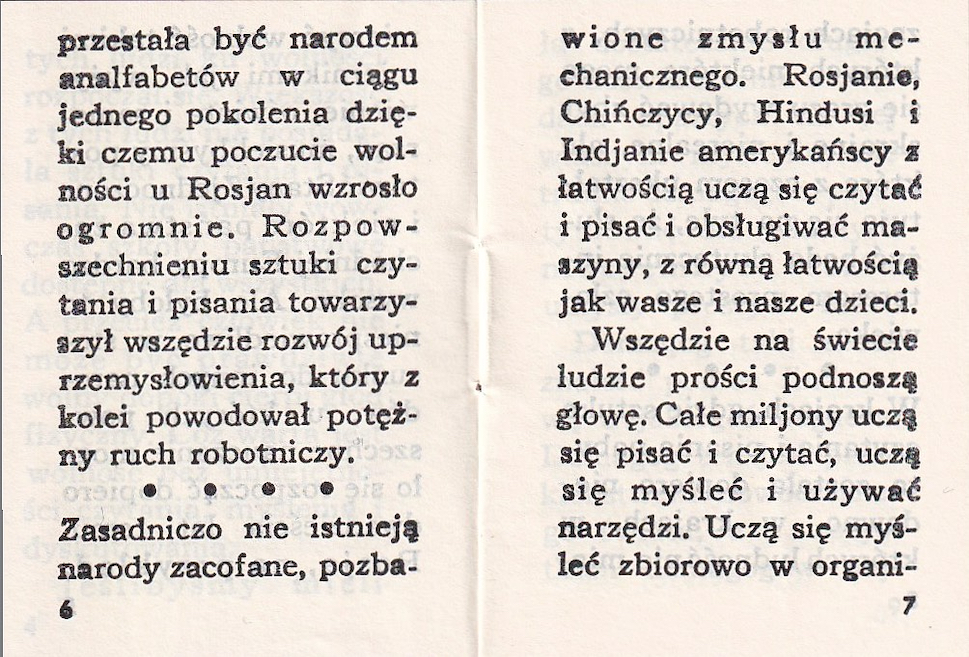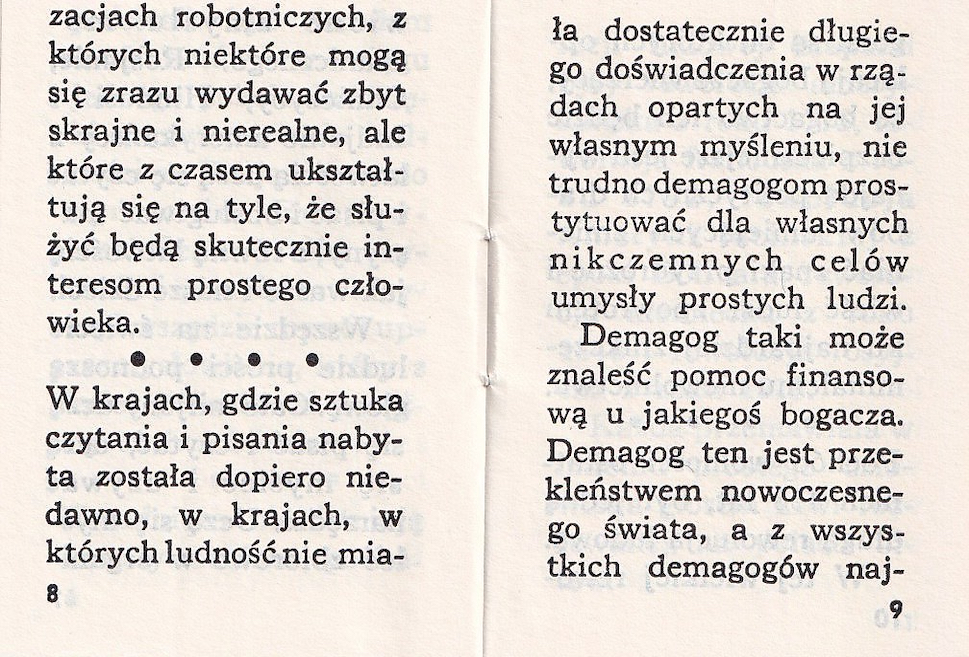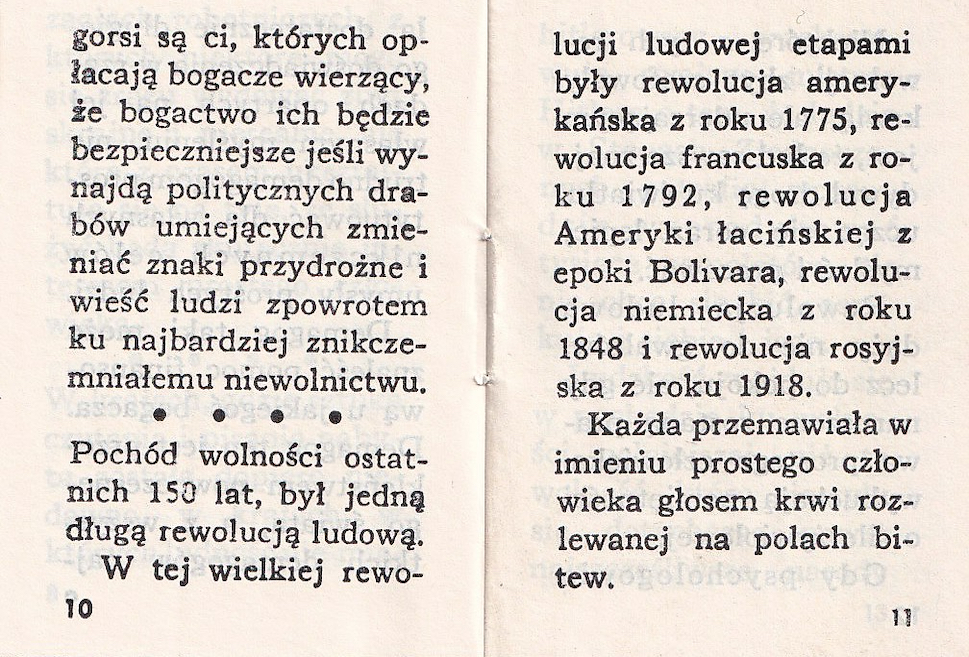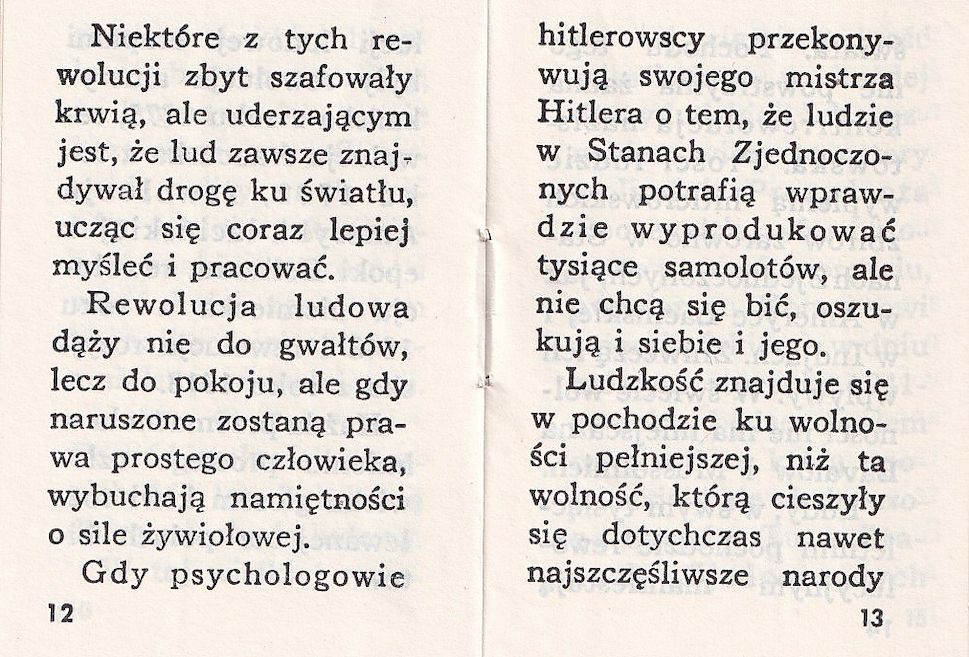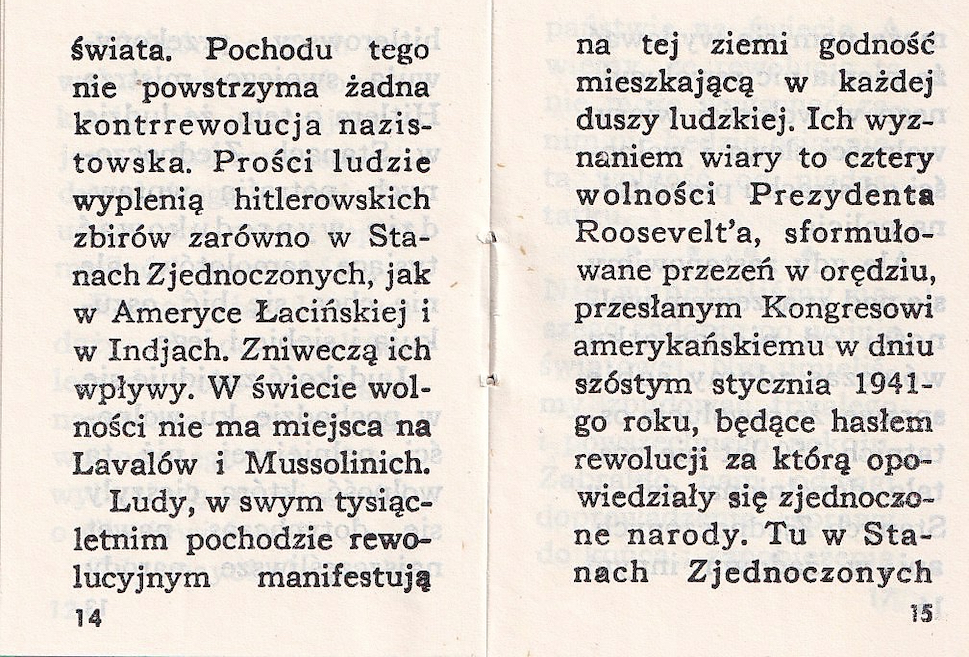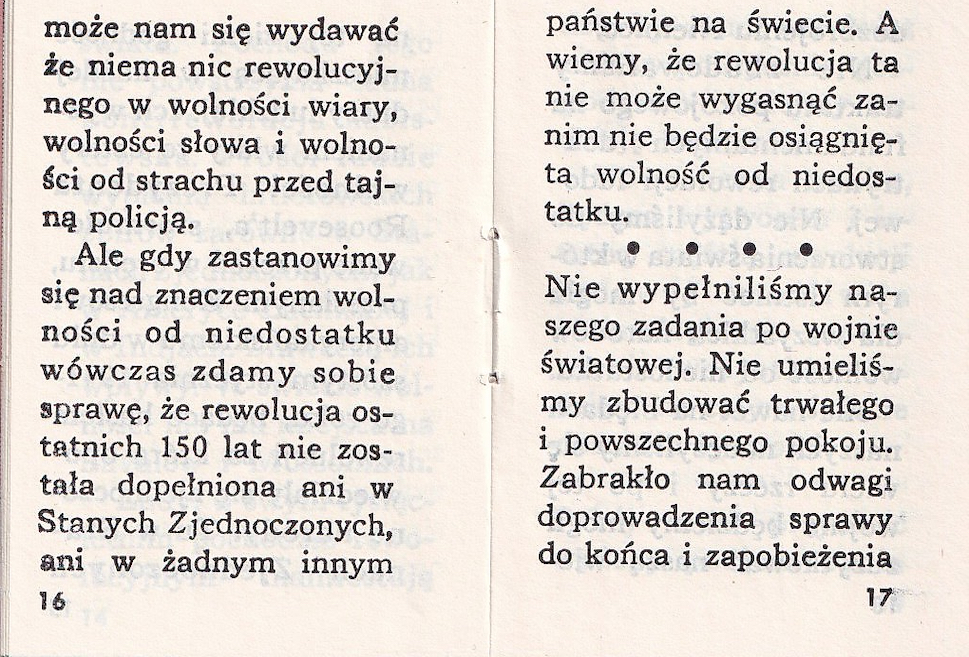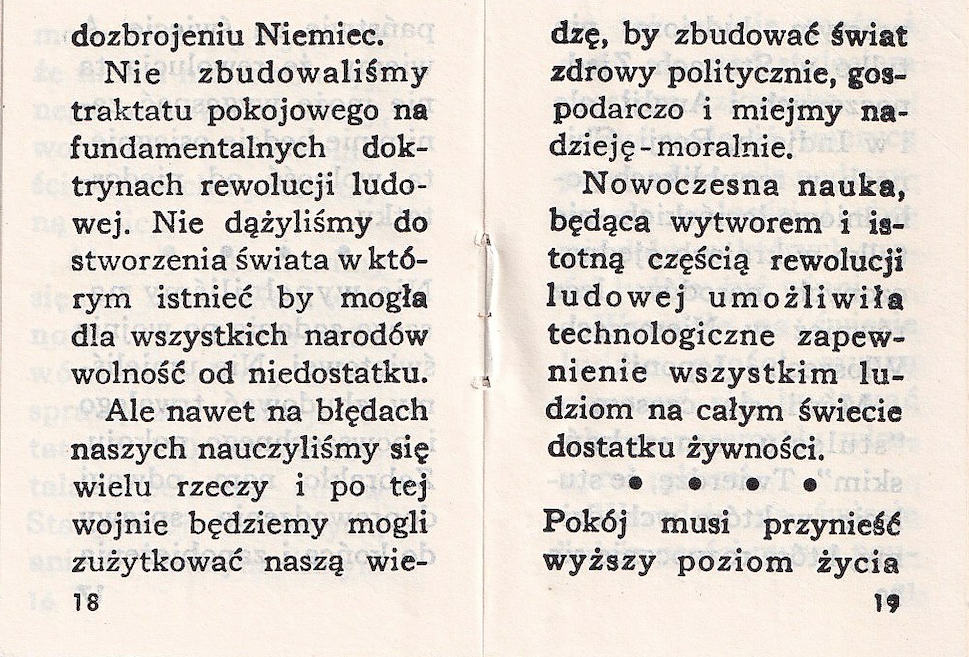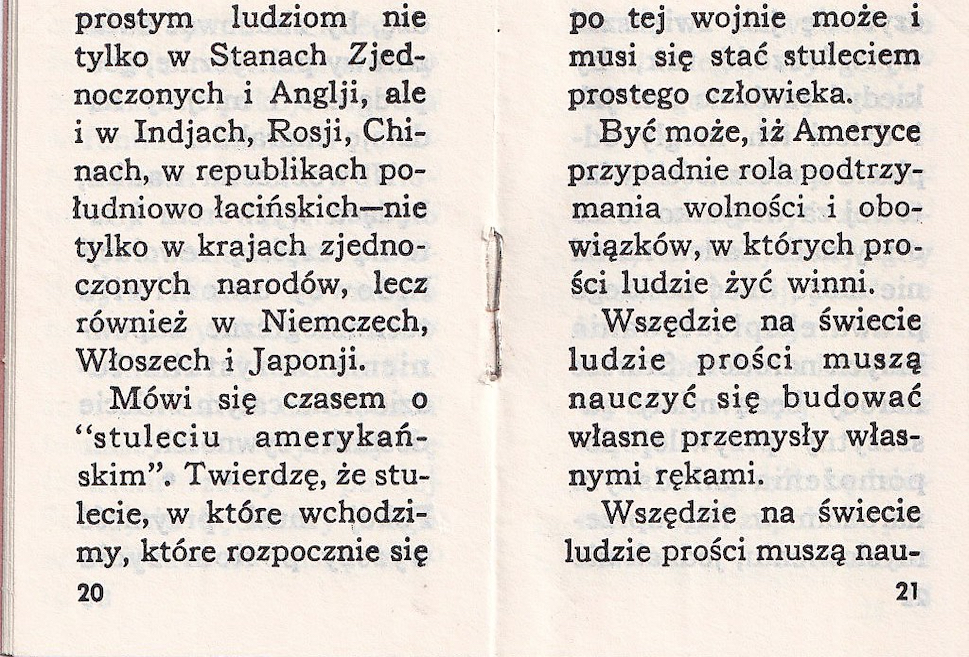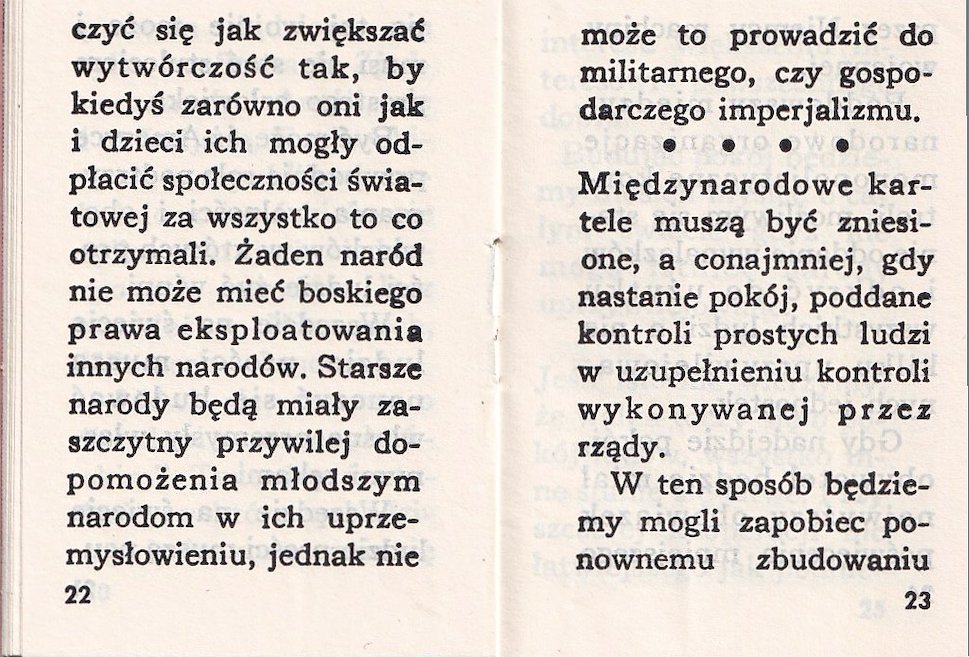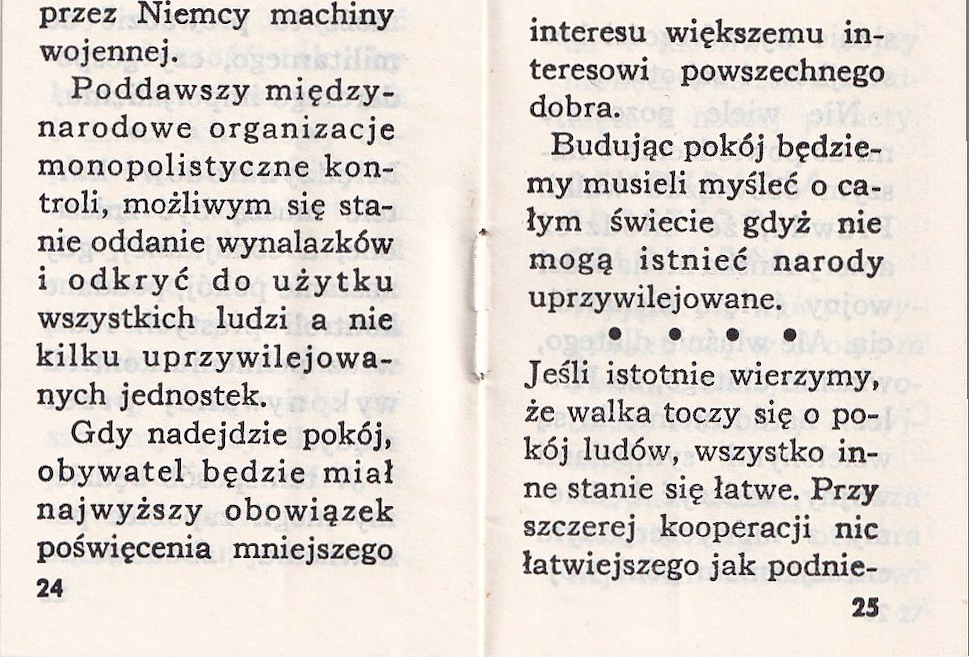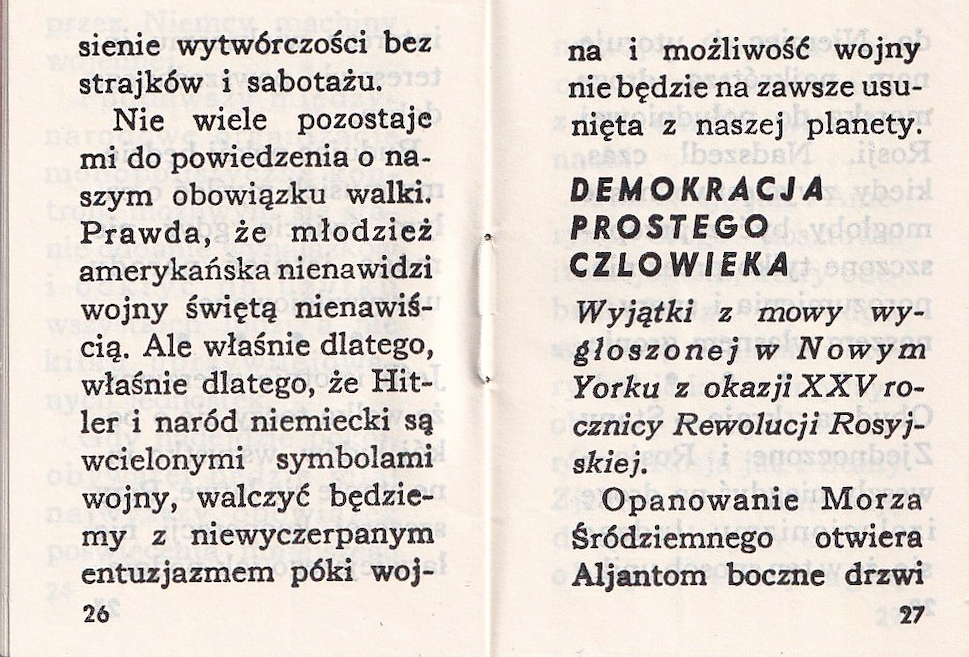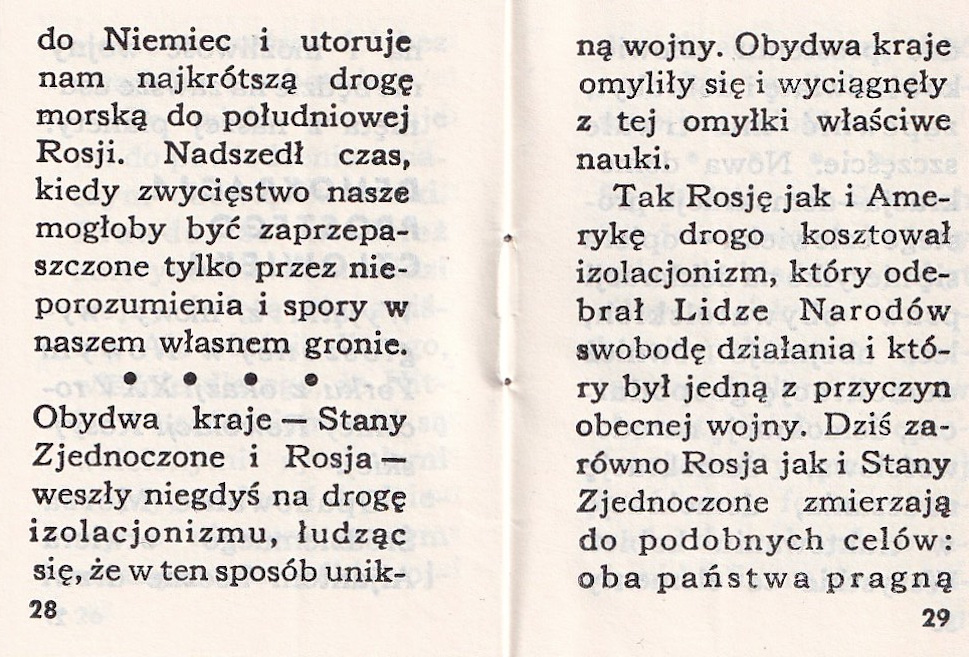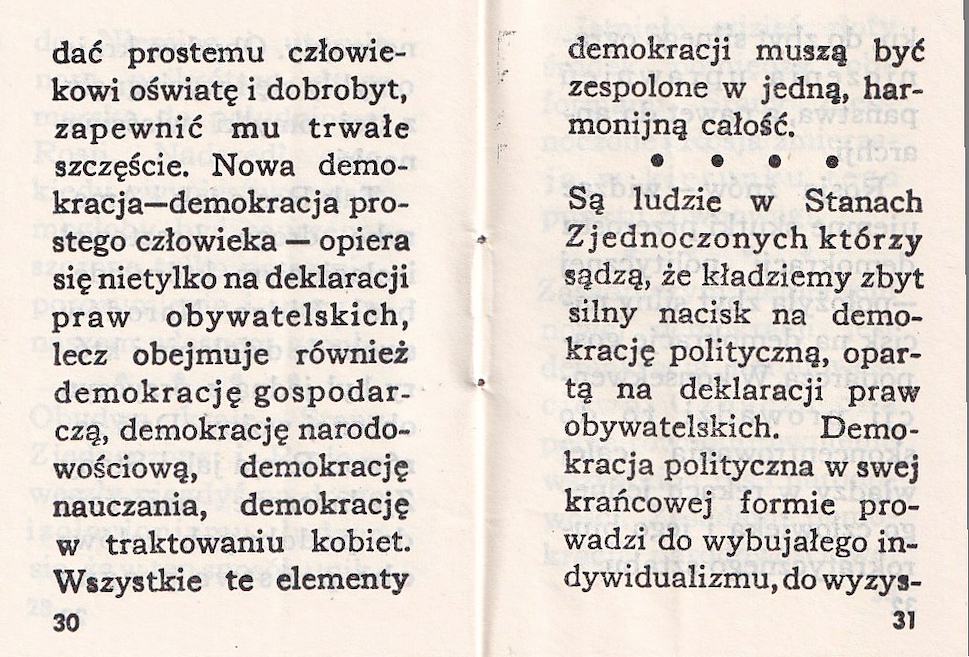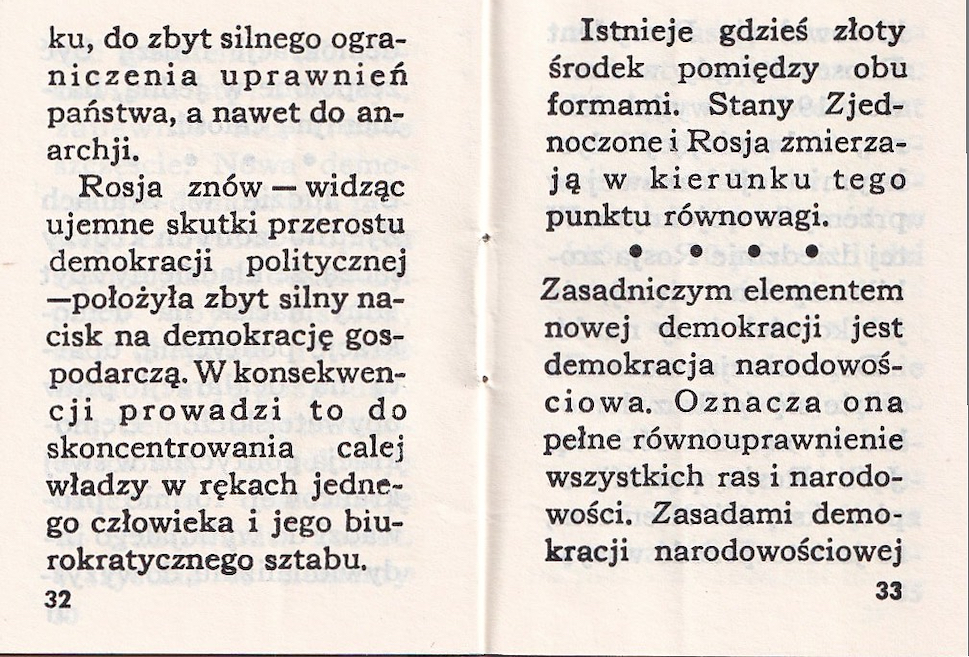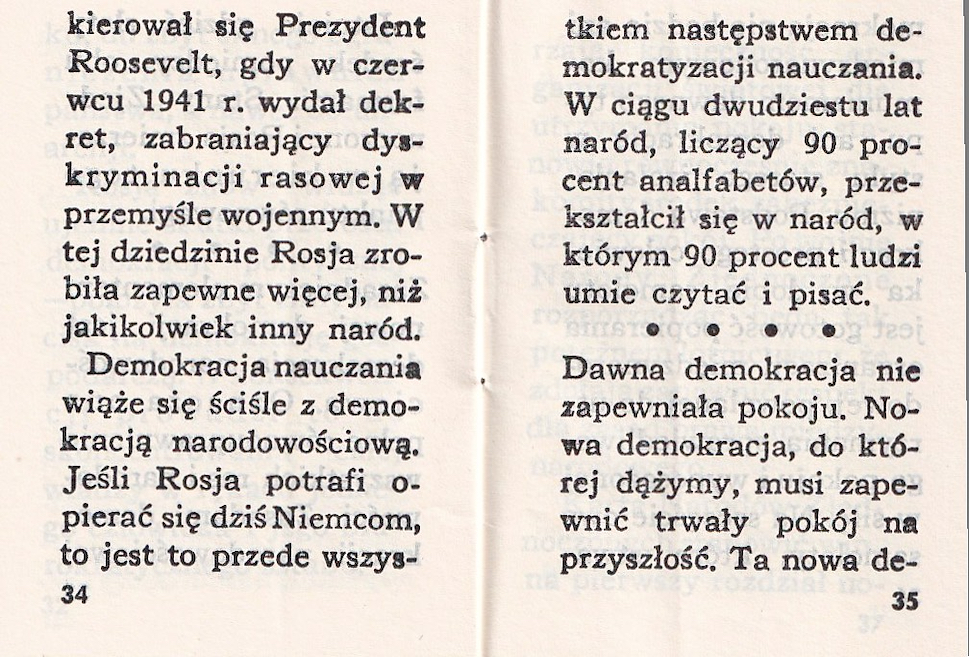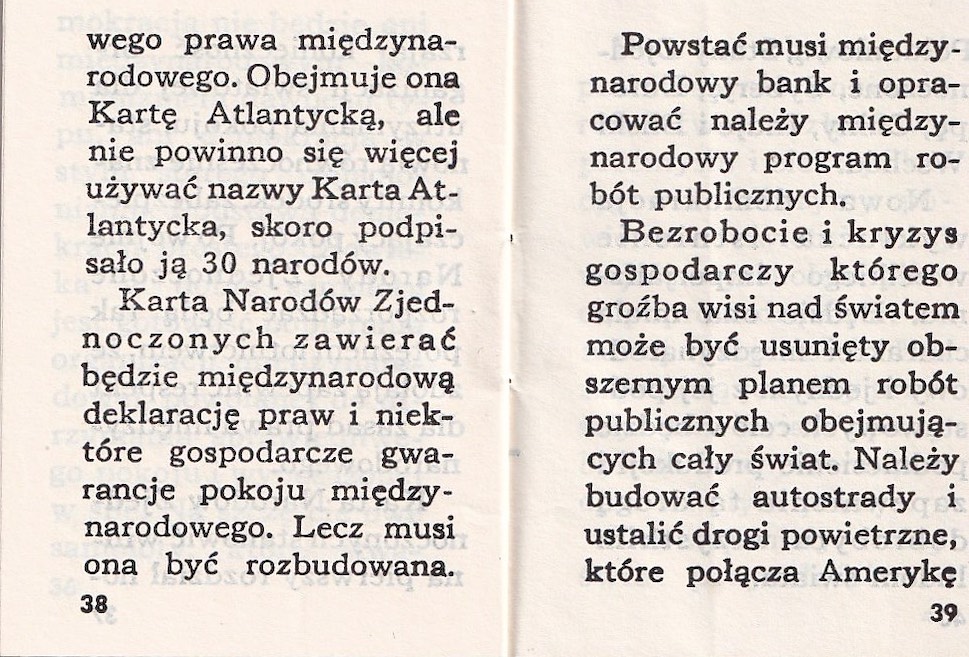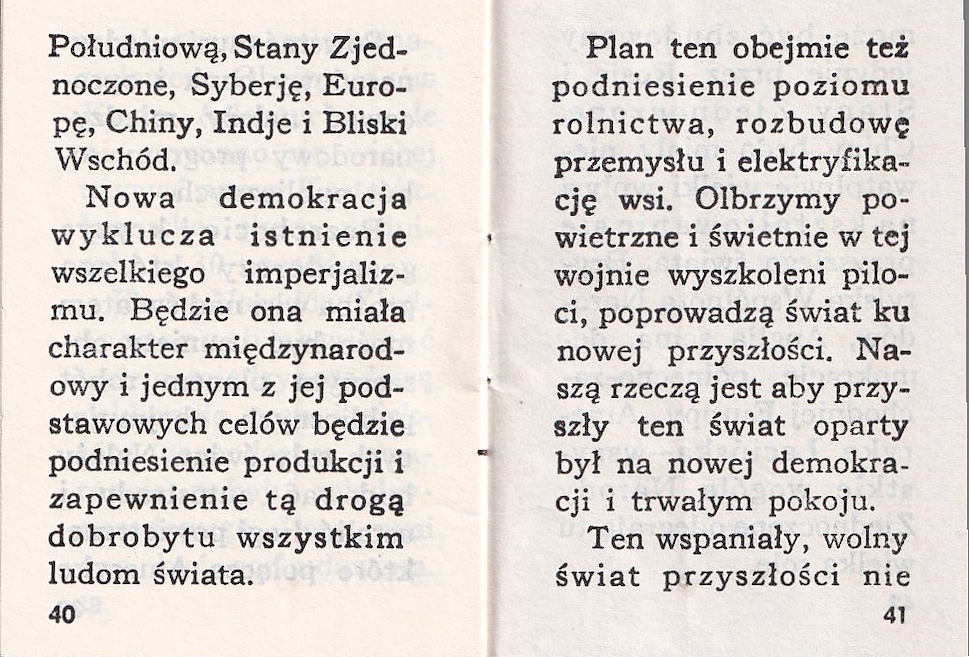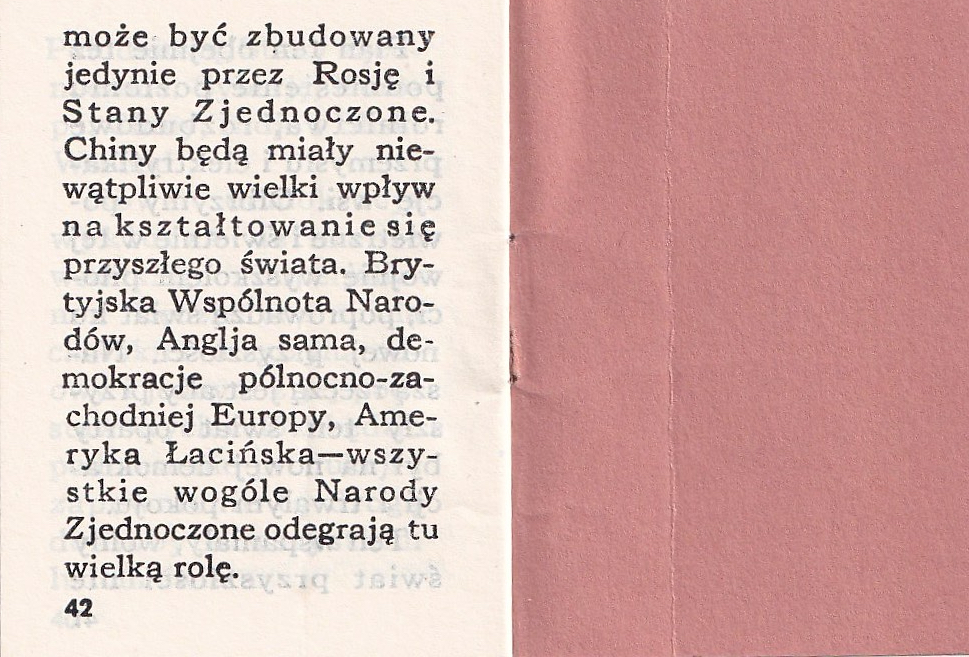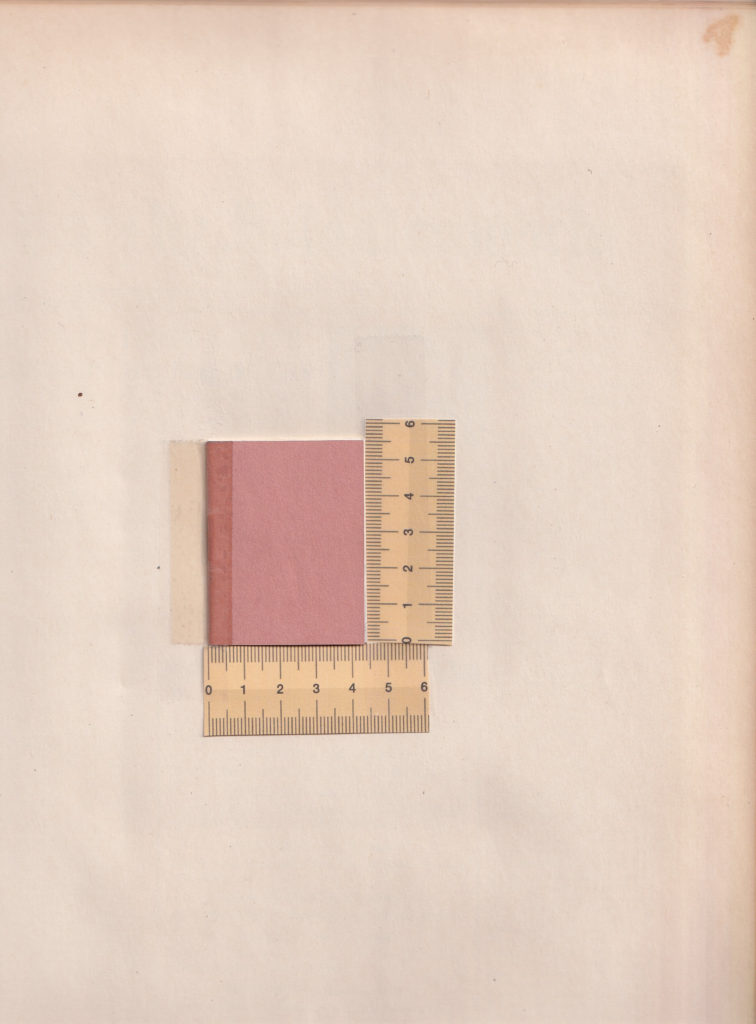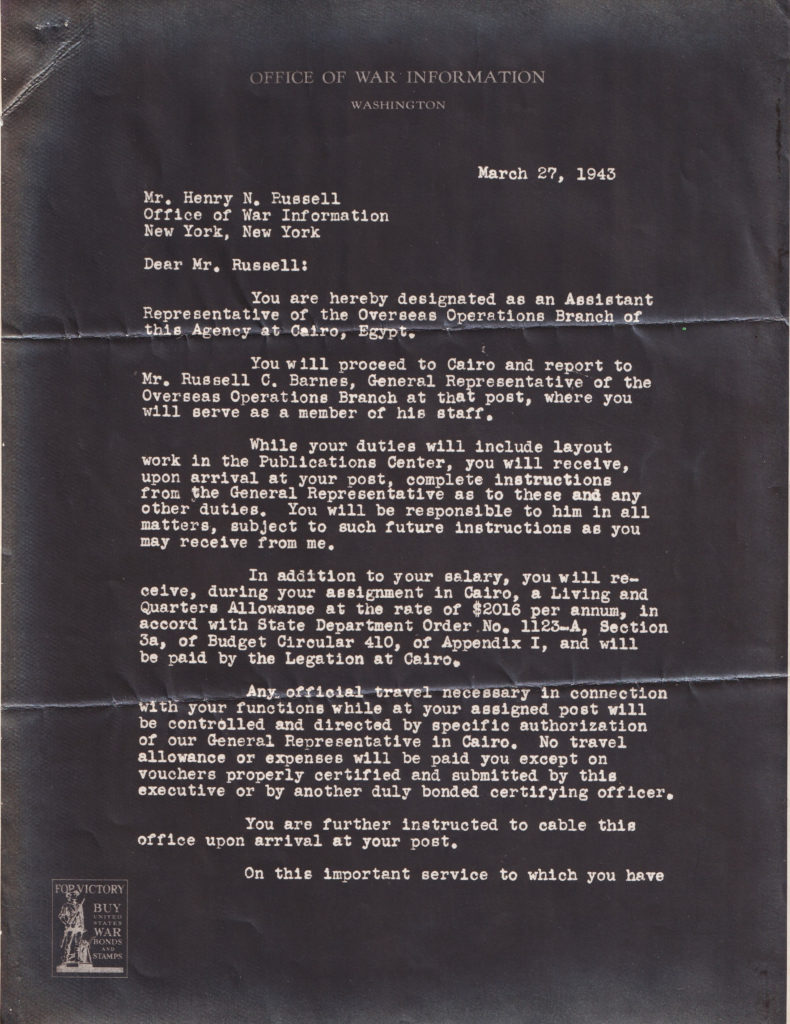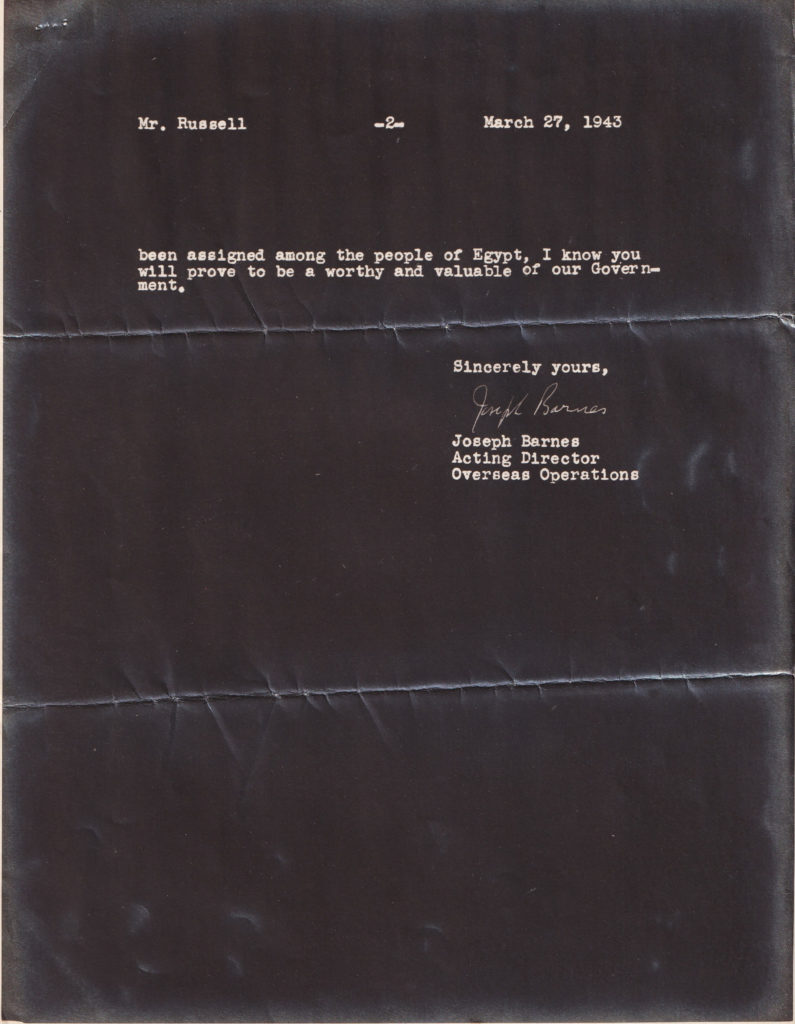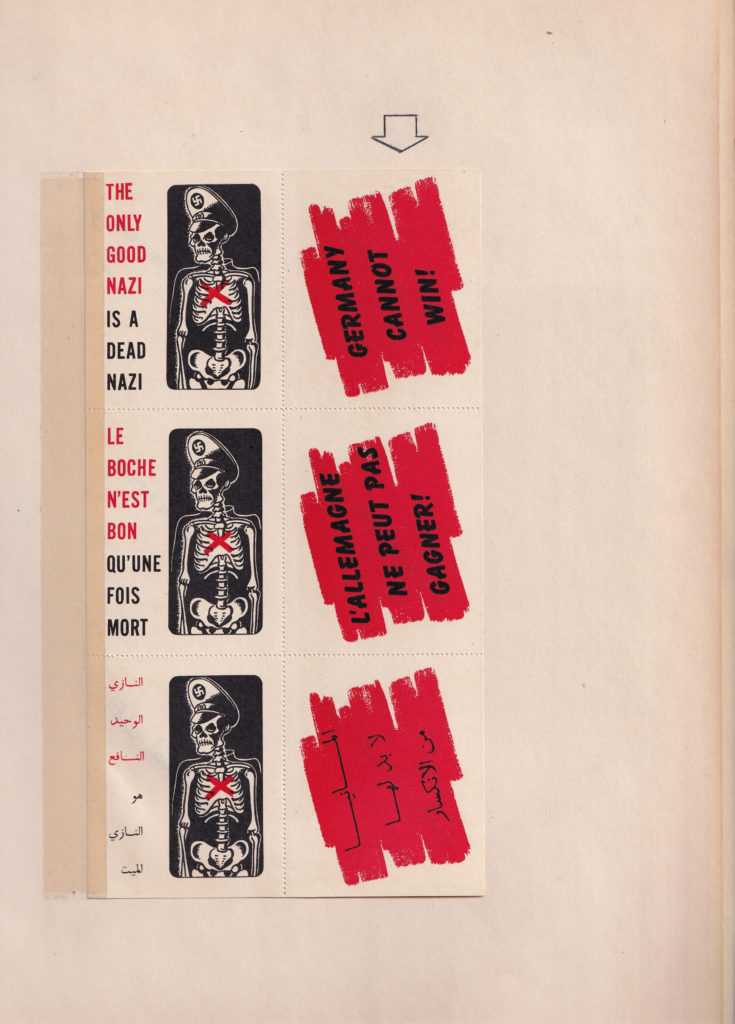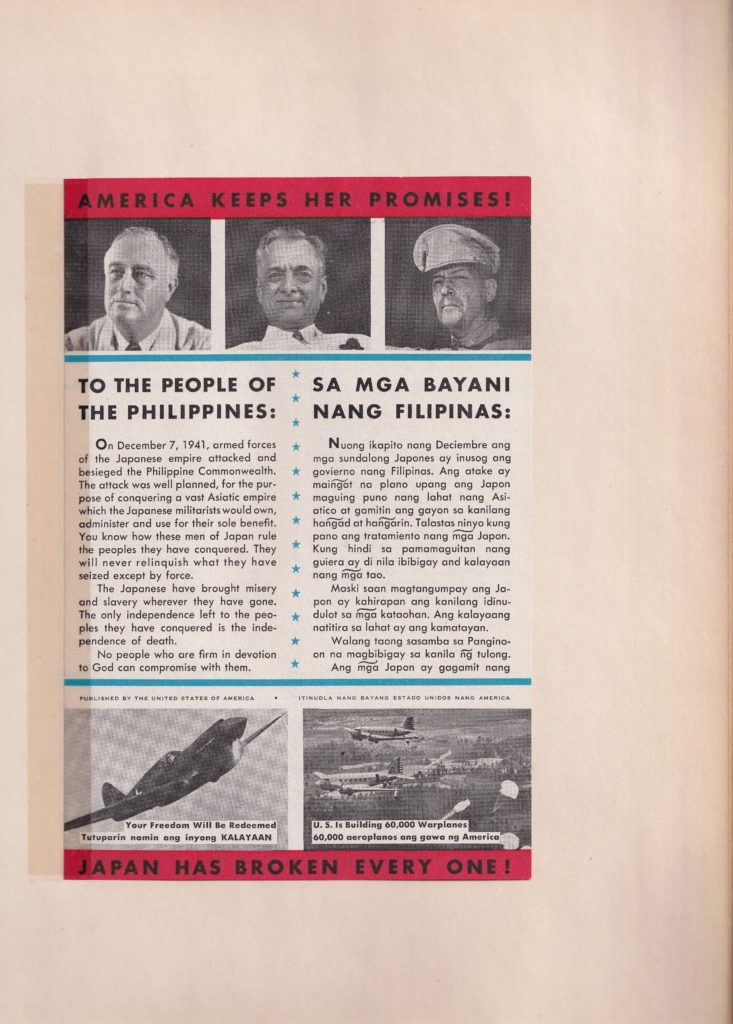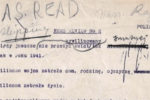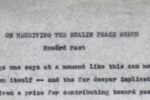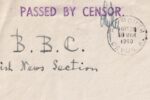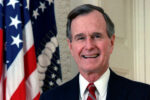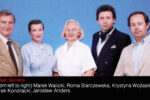Pro-sowiecka amerykańska broszura propagandowa dla Polaków
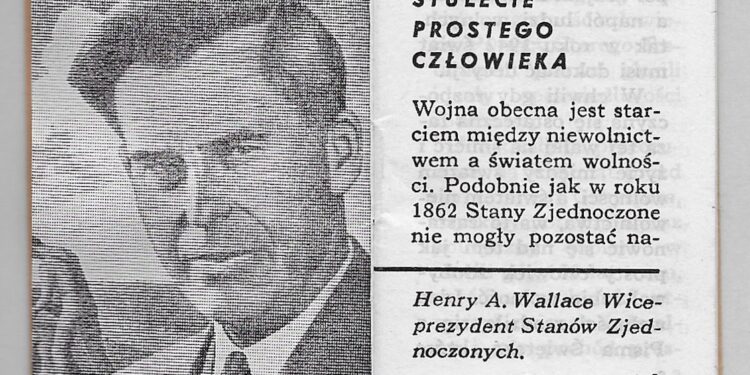
W czasie drugiej wojny światowej, Biuro Informacji Wojennej – Office of War Information (OWI) – poza przygotowywaniem programów radiowych Głosu Ameryki, wydawało i rozpowszechniało także wiele innych materiałów propagandowych w Stanach Zjednoczonych i za granicą. OWI wydrukował między innymi miniaturową broszurę w języku polskim, przeznaczoną być może dla żołnierzy 2 Korpusu Polskiego pod dowództwem generała Władysława Andersa w czasie gdy znajdowali się jeszcze na Bliskim Wschodzie lub gdy walczyli później z Niemcami we Włoszech. Broszura wydana przez amerykańską agencję rządową zawierała silne elementy propagandy prosowieckiej i prosocjalistycznej.
Sekcja Biura Informacji Wojennej w Nowym Jorku zaprojektowała i przetłumaczyła na różne języki tysiące ulotek, gazet i broszur propagandowych. Niektóre z nich można obejrzeć na stronie internetowej Muzeum Radia Zimnej Wojny – Polska. W sekcji tej pracowała przez pewien czas Mira Złotowska (Michałowska po drugim mężu – dyplomacie reżimu PRL, autorka Wojny domowej pisząca pod pseudonimem Maria Zientarowa). Jej praca w Biurze Informacji Wojennej Stanów Zjednoczonych na różnych stanowiskach trwała od października 1942 do grudnia 1944.
Muzeum posiada jeden egzemplarz miniaturowej 42 stronicowej broszury propagandowej w języku polskim z tłumaczeniami wyjątków z przemówień wiceprezydenta Stanów Zjednoczonych Henry’ego A. Wallace’a, jednego z najbardziej skrajnie lewicowych i prosowieckich członków ekipy Roosevelta. Broszury o rozmiarach 4,5 i 5,5 cm wydrukowane na bardzo cienkim papierze mogły być przeznaczone do zrzutów lotniczych nad Polską, w Niemczech dla Polaków wysłanych na prace przymusowe lub zmuszonych do służby w armii niemieckiej, lub ewentualnie dla żołnierzy polskich w Wielkiej Brytanii i żołnierzy 2 Korpusu Polskiego generała Władysława Andersa ewakuowanego z Rosji i walczącego z Niemcami u boku amerykańskich, brytyjskich i innych wojsk sojuszniczych.
Celem broszury było przekonanie Polaków, że nie należy obawiać się Rosji sowieckiej, ponieważ jest krajem wielkiego postępu społecznego i gospodarczego. Broszura miała też upewnić Polaków w przekonaniu, że Związek Sowiecki pozostanie po wojnie wraz ze Stanami Zjednoczonymi gwarantem pokoju, demokracji i praworządności. Agencja informacyjna rządu USA próbowała też zapewnić przez dobór cytat z przemówień wiceprezydenta Wallace’a, że Rosja będzie bronić suwerenności wszystkich mniejszych państw. Wielu żołnierzy 2 Korpusu było wcześniej więźniami łagrów w Związku Sowieckim, a tysiące ich oficerów potajemnie zamordowano na rozkaz Stalina w Katyniu i innych miejscach masowych egzekucji. Nie można jednak z całą pewnością stwierdzić, że broszura wychwalająca osiągnięcia komunizmu i sprawiedliwość społeczną w bolszewickiej Rosji była napisana z myślą o nich i czy Mira Michałowska brała udział w jej redagowaniu.
Broszura znajdowała się w albumie artysty-grafika Henry’ego N. Russella zatrudnionego w czasie wojny przez Biuro Informacji Wojennej i oddelegowanego w 1943 roku do oddziału zagranicznego OWI w Kairze. Russell nie był odpowiedzialny za dobór tekstu. Trudno ustalić, czy radykalni socjaliści, tacy jak Mira Złotowska lub Stefan Arski pracujący w biurach OWI w Nowym Jorku, mieli wpływ na wybór rażąco nieprawdziwych i naiwnych wypowiedzi o Rosji wiceprezydenta Wallace’a, czy wierzyli w to, co tłumaczyli do druku po polsku, a nawet czy pracowali nad tekstem broszury. Wiadomo jednak, że użyto w niej sformułowań bardzo podobnych do zawartych w innej broszurze propagandowej, której autorami byli prawie na pewno Arski i Złotowska, a także do sformułowań w tajnej dyrektywie propagandowej wydanej 1 maja 1943 roku przez szefa działu zagranicznego OWI Roberta E. Sherwooda i skierowanej prawdopodobnie do kierowników redakcji Głosu Ameryki i innych sekcji Biura Informacji Wojennej USA, ponieważ liczba kopii dokumentu była ograniczona.
Zgodnie z tymi dyrektywami propagandowymi dziennikarze Głosu Ameryki gloryfikowali Stalina w czasie wojny. Zachowało się bardzo niewiele oryginalnych tekstów i nagrań Głosu Ameryki z tego okresu. Sandro Gerbi, krewny jednego z radiowców sekcji włoskiej, Giuliano Gerbiego (1905-1976), który na antenie występował jako Mario Verdi, znalazł tekst programu do Włoch z 21 grudnia 1943 r. nagranego przez jego wuja.
Marszałek Stalin ma dziś 64 lata. To chyba najszczęśliwsze urodziny w całym politycznym i wojskowym życiu sowieckiego męża stanu. Najbardziej okazały dar pochodzi od jego żołnierzy. Najbardziej satysfakcjonującą nagrodą jest dla niego świadomość, że zrobił wszystko, co w jego mocy dla dobra Ojczyzny. Jego talenty ujawniły się już w jego polityce w czasach pokoju. Poprzez intensywną kampanię na rzecz podniesienia ducha narodu rosyjskiego, uświadomienia temu zniewolonemu przez carów narodowi własnej siły narodowej (21 grudnia 1943 r.).
– Sandro Gerbi, „Italy and the Voice of America”, Nowy Jork: Columbia University, Centro Primo Levi, 2010, https://primolevicenter.org/italy-and-the-voice-of-america/.
Warto odnotować, że Henry Wallace był wiceprezydentem w rządzie Roosevelta do 20 stycznia 1945 roku. Na wybory prezydenckie w 1944 roku kandydatem Partii Demokratycznej na urząd wiceprezydenta był Harry Truman. Po wyborach w 1944 r. prezydent Roosevelt mianował Wallace’a sekretarzem handlu, jednak Truman, który objął prezydenturę po śmierci Roosevelta, usunął Wallace’a ze stanowiska w rządzie. Powodem dymisji miało być wygłoszenie przez Wallace’a przemówienia zalecającego pojednawczy stosunek do Rosji sowieckiej. Wallace i jego radykalnie lewicowi zwolennicy utworzyli następnie Partię Postępową. Popierany przez Partię Komunistyczną USA, Wallace był kandydatem Partii Postępowej w wyborach prezydenckich w 1948 roku, ale otrzymał zaledwie 2,4% głosów.
Wallace wycofał swe poparcie dla Związku Sowieckiego dopiero w czasie wojny koreańskiej. W artykule opublikowanym w 1952 roku Wallace nazwał Związek Sowiecki krajem „całkowitego zła” (utterly evil), używając określenia podobnego do „imperium zła” (evil empire), którego prezydent Reagan użył przeciwko Rosji sowieckiej wiele lat później, narażając się na ostrą krytykę ze strony niektórych bardziej skrajnie lewicowych dziennikarzy i polityków amerykańskich i zachodnio-europejskich.
Warto podkreślić, że Henry Wallace wykazał na początku lat pięćdziesiątych znacznie więcej uczciwości i szczerości niż byli dyrektorzy i dziennikarze Głosu Ameryki, którzy nigdy nie przyznali się do błędu i nie potępili stanowczo komunizmu i Związku Sowieckiego. Spośród szefów agencji informacyjnej USA, tylko znany dziennikarz Edward R. Murrow, mianowany na to stanowisko przez prezydenta Johna Kennedy’ego, przyznał, że popełnił błąd, próbując skłonić BBC do wycofania z emisji jego własnego filmu Harvest of Shame („Żniwo wstydu” o trudnej sytuacji dorywczych pracowników rolnych w USA), ponieważ jako urzędnikowi państwowej instytucji wydał mu się trudny do zrozumienia dla oglądających go w innych krajach poza Stanami Zjednoczonymi i mógł być uznany przez niektórych za antyamerykańską propagandę. Inni urzędnicy agencji i Głosu Ameryki albo usprawiedliwiali prosowiecką propagandę i cenzurę w pierwszych i późniejszych latach istnienia Głosu Ameryki, albo milczeli na ten temat.
Howard Fast, szef działu wiadomości Głosu Ameryki w czasie wojny i późniejszy laureat Nagrody Pokojowej im. Stalina zerwał wprawdzie z Partią Komunistyczną USA, ale dopiero w 1956 roku. Fast skrytykował stłumienie przez Chruszczowa powstania węgierskiego, ale nie wyrzekł się poparcia dla komunizmu w Związku Sowieckim i w krajach satelickich. Nadal bronił i popierał komunistów za żelazną kurtyną, którzy jego zdaniem byli zwolennikami prawdziwego socjalizmu i dążyli do reform ustrojowych. Mira Michałowska była w PRL tłumaczką powieści historycznych Fasta.
Henry N. Russell, w którego albumie prac z lat 1942-1943 znajduje miniaturowa broszura w języku polskim nie był odpowiedzialny za polityczną treść amerykańskiej propagandy. Nie znamy też jego poglądów politycznych. Był znakomitym grafikiem, który dobrze wykonał poleconą mu pracę. Album zawiera materiały propagandowe w kilku językach.
Wielu pracowników OWI było lewicowymi idealistami oddanymi sprawie zwycięstwa w wojnie z nazistowskimi Niemcami i Japonią. Nie można olbrzymiej większości z nich podejrzewać o nielojalność wobec ich własnego społeczeństwa i rządu. Wielu pracowników OWI i Głosu Ameryki było jednak sowieckimi sympatykami i fellow travellers. Kilku było sowieckimi agentami wpływu, a niektórzy pracowali dla sowieckiego wywiadu.
Olbrzymia większość ponad 100 000 polskich żołnierzy, którzy walczyli z Niemcami na Zachodzie, pozostała wraz z rodzinami w Wielkiej Brytanii lub emigrowała do innych krajów zachodnich. Kilka tysięcy wróciło jednak do Polski. Trudno byłoby ustalić, czy prosowiecka i prosocjalistyczna propaganda Biura Informacji Wojennej USA i Głosu Ameryki miała jakiś wpływ na ich decyzje do powrotu do kraju pod rządami komunistycznymi. Niektórych z nich spotkały represje ze strony władz PRL, a kilkuset wywieziono po aresztowaniu do obozów w Związku Sowieckim, gdzie po raz drugi stali się więźniami Stalina. Zwolniono ich dopiero kilka lat po jego śmierci.
Głos Ameryki nie przyznał się, że szerzył prostalinowską i prosowiecką propagandę i dezinformację podczas II wojny światowej i krótko po niej. Kierownictwo stacji nigdy nie wydało żadnych komentarzy wskazujących, że dziennikarze zatrudnieni w pierwszych latach istnienia rozgłośni popełnili tragiczne błędy i że ich propaganda mogła spowodować, iż pewna liczba uchodźców wróciła do krajów rządzonych przez zdominowane przez Moskwę reżimy komunistyczne, gdzie niektórzy zostali aresztowani, a niektórzy stracili życie.
WWII Pro-Soviet U.S. Government Propaganda in Polish Was Spread in Pamphlets and Voice of America Radio Broadcasts
During World War II, the Office of War Information (OWI) produced and distributed printed propaganda material in the United States and abroad and was also responsible for the Voice of America (VOA) shortwave and medium-wave radio broadcasts for worldwide audiences. Sometime in 1942 or 1943, OWI designed and printed a miniature brochure in Polish, which may have been intended for the soldiers of the 2nd Polish Corps under the command of General Władysław Anders, who were fighting the Nazi German Army in Italy. The Polish-language pamphlet from the wartime U.S. government agency included numerous themes of pro-Soviet and pro-socialist propaganda from speeches delivered by U.S. Vice President Henry A. Wallace, a far left-leaning Democrat who served with President Franklin Delano Roosevelt from January 20, 1941 to January 20, 1945.
The division of the Office of War Information in New York designed thousands of similar leaflets, newspapers, and propaganda brochures and translated them into various languages. Some can be viewed on the website of the Cold War Radio Museum – Poland. According to personnel records in the National Archives, the OWI office employed from October 1942 until December 1944 a pre-war young communist activist in Poland Mira Złotowska (Michałowska, after her second husband, a diplomat of the Polish People’s Republic). After the war, she was the author of a popular book turned into a television series in communist-ruled Poland. While employed by OWI in New York, Michałowska and her partner Stefan Arski (Artur Salman) also produced programs for the Voice of America broadcasts. Arski became later one of the key anti-U.S. propagandists for the communist regime in Warsaw.
The Cold War Radio Museum – Poland has one copy of a 42-page miniature propaganda booklet in Polish with translations of excerpts from speeches by Vice President of the United States Henry A. Wallace, one of the most outspoken pro-Soviet members of President Roosevelt’s team. The 4.5 and 5.5 cm brochures printed on very thin paper could have been intended for airdrops over Poland, for Poles sent to do forced labor in Germany or required to serve in the German army, or possibly for Polish soldiers in Great Britain and soldiers of the 2nd Polish Corps of General Władysław Anders, who were evacuated from Russia in 1942 and were fighting the Germans alongside British, American and other allied forces in Italy.
The brochure aimed to convince Poles that they should not be afraid of Soviet Russia because it is a country of great social and economic progress. The pamphlet also pointed out that Russia, together with the United States, will remain after the war guarantor of peace, democracy and the rule of law. The U.S. government information agency also tried to ensure by its selection of quotes from Vice President Wallace’s speeches that Russia would defend the sovereignty of all smaller states.
Many soldiers of the Polish 2nd Corps had been prisoners in slave labor camps in the Soviet Union. It seems doubtful that many of them would find such pro-Soviet American propaganda believable. Thousands of their officers were secretly murdered on Stalin’s orders in Katyn and other places of mass execution in Russia. However, it cannot be said with certainty that the Office of War Information pamphlet praising the achievements of communism and social justice in Bolshevik Russia was written specifically for the Polish soldiers in Italy and whether Mira Złotowska (Michałowska) participated in its editing. The U.S. government information agency designed it to be read by Poles. However, we do not know where it was to be distributed.
Russia, for example, was changed from an illiterate to a literate nation within one generation and, in the process, Russia’s appreciation of freedom was tremendously increased.
Today both Russia and the United States are seeking similar goals: both states are striving for the education, the productivity, and the enduring happiness of the common man.
In this Great Revolution of the people, there were the American Revolution of 1775, the French Revolution of 1792, the Latin-American revolutions of the Bolivarian era, the German Revolution of 1848, and the Russian Revolution of 1918.
Russia, perceiving some of the abuses of excessive political democracy, has placed strong emphasis on economic democracy. This, carried to an extreme, demands that all power be centered in one man and his bureaucratic helpers.Somewhere there is a practical balance between economic and political democracy. Russia and the United States both have been working toward this practical middle ground.
President Roosevelt was guided by principles of ethnic democracy when in June of 1941 he Issued an Executive Order prohibiting racial discrimination in the employing of workers by national-defense industries.
Russia has probably gone further than any other nation in the world in practicing ethnic democracy.
Democracy of education is closely linked with ethnic democracy.
It is because of educational democracy that Russia today is able to resist Germany.
— Quotes from U.S. Vice President Henry Wallace’s speeches in a World War II Office of War Information (OWI) propaganda brochure published in Polish.
The brochure was included in the album of the graphic artist Henry N. Russell, employed during the war by the Office of War Information and delegated in 1943 to the foreign branch of the OWI in Cairo. Russell was not responsible for the selection of the text. It is difficult to determine whether radical socialists such as Mira Złotowska or Stefan Arski, working at that time in the OWI offices in New York, influenced the choice of Vice President Wallace’s blatantly untrue and naive statements about Russia or believed that what they were translating into print in Polish was true, and even whether they were working on the text of the brochure. It is known, however, that it used phrases very similar to those contained in another pro-socialist propaganda pamphlet, the authors of which were almost certainly Arski and Złotowska, as well as to some of the pro-Soviet statements in the secret propaganda directive issued on May 1, 1943, by the head of the Overseas Division, Robert E. Sherwood, and probably addressed to the chief editors of the Voice of America and heads of other OWI sections, since the number of copies of the document was limited.
Voice of America broadcasters followed these propaganda directives and glorified Stalin in their broadcasts. Very few original Voice of America World War II recordings and scripts have been preserved, but Sandro Gerbi, a nephew of one of the early VOA Italian broadcasters, Giuliano Gerbi (1905-1976), whose on-air name was Mario Verdi, found a VOA script dated December 21, 1943 which was recorded by his uncle.
Today Marshal Stalin is 64. It is perhaps the happiest birthday of the Soviet Statesman’s entire political and military life. The most sumptuous gift has come from his soldiers. The most gratifying reward for him is the consciousness that he has done everything in his power for the good of his Country. His talents had already manifested themselves through his policies in times of peace. Through an intense campaign to raise the spirit of the Russian people, to give this people, enslaved by the Tsars, the awareness of their own national strength (December 21, 1943).
– Sandro Gerbi, “Italy and the Voice of America,” New York: Columbia University, Centro Primo Levi, 2010, https://primolevicenter.org/italy-and-the-voice-of-america/.
In the 1944 presidential election, the Democratic Party’s nominee for vice president was Harry Truman. It is worth noting that Henry Wallace was Vice President in the Roosevelt administration until January 20, 1945. President Roosevelt appointed Wallace Secretary of Commerce. After assuming the presidency following Roosevelt’s death, Truman removed Wallace from his cabinet post, reportedly because of Wallace’s speech in 1946 advocating a conciliatory approach to Soviet Russia.
Wallace and his radical left-wing supporters subsequently formed the Progressive Party. They were criticized for their decision to start a splinter party and for their unquestioning support for the Soviet Union by other Democratic Party progressives, including future Vice President Hubert Humphrey and American labor unions. Backed by the Communist Party USA, Wallace was the Progressive Party’s nominee in the 1948 presidential election but received only 2.4% of the vote.
Wallace did not withdraw his support for the Soviet Union until the Korean War. In an article written in 1952, Wallace called the Soviet Union a country “utterly evil,” a term similar to the “evil empire” that President Reagan used against Soviet Russia many years later, drawing heavy criticism from some of the more far-left American and Western European journalists and politicians.
It is worth noting that Wallace showed much more honesty and sincerity in the early 1950s than former Voice of America executives and journalists, who never admitted they were wrong and did not strongly condemn Communism and the Soviet Union. Of the heads of the U.S. government’s information agency, only the well-known journalist Edward R. Murrow, selected for the position by President John F. Kennedy, admitted that he had made a mistake in trying to get the BBC to withdraw from broadcasting his own film Harvest of Shame about migrant agricultural workers employed by American farmers because as a Kennedy administration official, he thought his film, made initially to be shown in the United States, could be too anti-American and perhaps misunderstood by foreign audiences. Other information agency and Voice of America officials before and after Murrow either excused pro-Soviet propaganda and censorship in the early and later years since the start of Voice of America broadcasts in 1942 or remained silent on the subject.
Howard Fast, head of the Voice of America’s wartime news and later recipient of the Stalin Peace Prize, broke with the Communist Party USA, but not until 1956. Fast criticized Khrushchev’s suppression of the Hungarian uprising. Still, he did not renounce his support for communism in the Soviet Union and in its satellite countries. He continued to support those communist leaders who, in his opinion, were believers in true socialism and sought political reforms. Mira Michałowska translated Fast’s historical novels, which were published after the war in Poland under communism.
In mid-1943, the Roosevelt administration secretly forced John Houseman out from his position as the first director in charge of the production of Voice of America broadcasts after Under Secretary of State Sumner Welles informed the White House that Houseman was hiring communists for VOA jobs. In his memoirs, The White House Years: Waging Peace 1956-1961, published after leaving the White House, former President Dwight D. Eisenhower, who during the war served as the Supreme Commander of the Allied Expeditionary Force in Europe, accused top officials responsible for wartime Voice of America broadcasts of being “insubordinate” toward President Roosevelt because their propaganda put at risk the lives of American and other allied soldiers under his command.
Howard Fast was forced to resign from his Voice of America job in 1944. Still, other Soviet sympathizers remained until the Truman administration quietly fired them in the late 1940s and the early 1950s. Replacing them were anti-communist refugee journalists, such as a former Polish anti-Nazi underground resistance member, Zofia Korbońska, who, encouraged by President Truman’s “Campaign of Truth,” changed the content of Voice of America broadcasts from pro-Soviet to countering communist censorship behind the iron curtain and exposing Soviet propaganda.
Henry N. Russell, a graphic artist whose album of works from 1942-1943 contained a small pamphlet in Polish, was not responsible for the political content of American propaganda. His album contains propaganda material in many languages, which he designed but did not write. We do not know his political views. He was, however, an excellent graphic designer.
Many OWI employees were left-wing idealists dedicated to winning the war against Nazi Germany and Japan and not in any way disloyal toward the United States. Many, however, were Soviet sympathizers and fellow travelers. Several were Soviet agents of influence, and a few were Soviet spies.
The vast majority of over 100,000 Polish soldiers who fought against the Germans in the West stayed with their families in Great Britain or emigrated to other Western countries. However, several thousand returned to Poland. It would be difficult to determine whether the pro-Soviet and pro-socialist propaganda of the Office of War Information and the Voice of America influenced their decision to return to their country under communist rule. Some of them were repressed by the authorities of the People’s Republic of Poland. Several hundred were deported after being arrested to camps in the Soviet Union, where some became Stalin’s prisoners for the second time. They were released only a few years after his death. The Voice of America has not admitted that it spread pro-Stalin and pro-Soviet propaganda and disinformation during and shortly after World War II. The station’s management has never issued any comments indicating that the early VOA broadcasters made tragic mistakes and that their propaganda may have caused some people to return to countries ruled by Moscow-dominated communist regimes, where some were arrested, and some lost their lives.
Scroll Down for Full English Translation of the Propaganda Brochure
STULECIE
PROSTEGO
CZŁOWIEKA
Henry A. Wallace Wiceprezydent Stanów Zjednoczonych.
Wojna obecna jest starciem między niewolnictwem a światem wolności. Podobnie jak w roku 1862 Stany Zjednoczone nie mogły pozostać napół krajem niewolników a napół ludzi wolnych, tak w roku 1942 świat musi dokonać decyzji.
W chwili gdy rozpoczyna się ostateczna faza tej walki na śmierć i życie między światem wolności, a światem niewolnictwa, warto zastanowić się nad tem jak prosty człowiek zdobywał sobie wolność. Idea wolności zrodziła się z Pisma Świętego, które kładzie szczególny nacisk na godność człowieka. Prorocy Starego Testamentu pierwsi głosili ideały sprawiedliwości społecznej.
Ale ideały te, przeczuwane na wiele lat przed narodzeniem Chrystusa, uzyskały potężny wyraz polityczny dopiero w chwili gdy 150 lat temu, naród amerykański utworzył związek federalny i gdy pochód prostych ludzi ku wolności rozpoczął się. Większość z tych ludzi nie posiadała sztuki czytania i pisania. Nie istniały wówczas szkoły państwowe dostępne dla wszystkich. A przecież człowiek nie może być prawdziwie wolny dopóki cierpi głód fizyczny. Cóż warta jest wolność bez umiejętności czytania, myślenia i dyskutowania.
Jeślibyśmy mieli mierzyć wolność takimi miernikami jak wyżywienie, oświata i samorząd, musielibyśmy postawić Stany Zjednoczone i niektóre państwa zachodniej Europy bardzo wysoko. Ale byłoby to niesprawiedliwe w stosunku do innych narodów, u których powszechne nauczanie mogło się rozpocząć dopiero dwadzieścia lat temu. Rosja, na przykład, przestała być narodem analfabetów w ciągu jednego pokolenia dzięki czemu poczucie wolności u Rosjan wzrosło ogromnie. Rozpowszechnieniu sztuki czytania i pisania towarzyszył wszędzie rozwój uprzemysłowienia, który z kolei powodował potężny ruch robotniczy.
• • • •
Zasadniczo nie istnieją narody zacofane, pozbawione umysłu mechanicznego. Rosjanie, Chińczycy, Hindusi i Indjanie amerykańscy z łatwością uczą się czytać i pisać i obsługiwać maszyny, z równą łatwością jak wasze i nasze dzieci. Wszędzie na świecie ludzie prości podnoszę głowę. Całe miljony uczą się pisać i czytać, uczą się myśleć i używać narzędzi. Uczą się myśleć zbiorowo w organizacjach robotniczych, z których niektóre mogą się zrazu wydawać zbyt skrajne i nierealne, ale które z czasem ukształtują się na tyle, że służyć będą skutecznie interesom prostego człowieka.
• • • •
W krajach, gdzie sztuka czytania i pisania nabyta została dopiero niedawno, w krajach, w których ludność nie miała dostatecznie długiego doświadczenia w rządach opartych na jej własnym myśleniu, nie trudno demagogom prostytuować dla własnych nikczemnych celów umysły prostych ludzi.
Demagog taki może znaleść pomoc finansową u jakiegoś bogacza. Demagog ten jest przekleństwem nowoczesnego świata, a z wszystkich demagogów najgorsi są ci, których opłacają bogacze wierzący, ze bogactwo ich będzie bezpieczniejsze jeśli wynajdą politycznych drabów umiejących zmieniać znaki przydrożne i wieść ludzi zpowrotem ku najbardziej znikczemniałemu niewolnictwu.
• • • •
Pochód wolności ostatnich 150 lat, był jedną długą rewolucją ludową.
W tej wielkiej rewolucji ludowej etapami były rewolucja amerykańska z roku 1775, rewolucja francuska z roku 1792, rewolucja Ameryki łacińskiej z epoki Bolivara, rewolucja niemiecka z roku 1848 i rewolucja rosyjska z roku 1918.
Każda przemawiała w imieniu prostego człowieka głosem krwi rozlewanej na polach bitew.
Niektóre z tych rewolucji zbyt szafowały krwią, ale uderzającym jest, że lud zawsze znajdywał drogę ku światłu, ucząc się coraz lepiej myśleć i pracować.
Rewolucja ludowa dąży nie do gwałtów, lecz do pokoju, ale gdy naruszone zostaną prawa prostego człowieka, wybuchają namiętności o sile żywiołowej.
Gdy psychologowie hitlerowscy przekonywują swojego mistrza Hitlera o tem, że ludzie w Stanach Zjednoczonych potrafią wprawdzie wyprodukować tysiące samolotów, ale nie chcą się bić, oszukują i siebie i jego.
Ludzkość znajduje się w pochodzie ku wolności pełniejszej, niż ta wolność, którą cieszyły się dotychczas nawet najszczęśliwsze narody świata. Pochodu tego nie powstrzyma żadna kontrrewolucja nazistowska. Prości ludzie wyplenia hitlerowskich zbirów zarówno w Stanach Zjednoczonych, jak w Ameryce Łacińskiej i w Indjach. Zniweczą ich wpływy. W świecie wolności nie ma miejsca na Lavalow i Mussolinich.
Ludy, w swym tysiącletnim pochodzie rewolucyjnym manifestują na tej ziemi godność mieszkającą w każdej duszy ludzkiej. Ich wyznaniem wiary to cztery wolności Prezydenta Roosevelt’a, sformułowane przezeń w orędziu, przesłanym Kongresowi amerykańskiemu w dniu szóstym stycznia 1941-go roku, będące hasłem rewolucji za którą opowiedziały się zjednoczone narody. Tu w Stanach Zjednoczonych może nam się wydawać że niema nic rewolucyjnego w wolności wiary, wolności słowa i wolności od strachu przed tajną policją.
Ale gdy zastanowimy się nad znaczeniem wolności od niedostatku wówczas zdamy sobie sprawę, że rewolucja ostatnich 150 lat nie została dopełniona ani w Stanych Zjednoczonych, ani w żadnym innym państwie na świecie. A wiemy, że rewolucja ta nie może wygasnąć zanim nie będzie osiągnięta wolność od niedostatku.
• • • •
Nie wypełniliśmy naszego zadania po wojnie światowej. Nie umieliśmy zbudować trwałego i powszechnego pokoju. Zabrakło nam odwagi doprowadzenia sprawy do końca i zapobieżenia dozbrojeniu Niemiec. Nie zbudowaliśmy traktatu pokojowego na fundamentalnych doktrynach rewolucji ludowej. Nie dążyliśmy do stworzenia świata w którym istnieć by mogła dla wszystkich narodów wolność od niedostatku.
Ale nawet na błędach naszych nauczyliśmy się wielu rzeczy i po tej wojnie będziemy mogli zużytkować naszą wiedzę, by zbudować świat zdrowy politycznie, gospodarczo i miejmy nadzieję-moralnie.
Nowoczesna nauka, będąca wytworem i istotną częścią rewolucji ludowej umożliwiła technologiczne zapewnienie wszystkim ludziom na całym świecie dostatku żywności.
• • • •
Pokój musi przynieść wyższy poziom życia prostym ludziom nie tylko w Stanach Zjednoczonych i Anglji, ale i w Indjach, Rosji, Chinach, w republikach południowo łacińskich—nie tylko w krajach zjednoczonych narodów, lecz również w Niemczech, Włoszech i Japonji.
Mówi się czasem o “stuleciu amerykańskim”. Twierdzę, że stulecie, w które wchodzimy, które rozpocznie się po tej wojnie może i musi się stać stuleciem prostego człowieka.
Być może, iż Ameryce przypadnie rola podtrzymania wolności i obowiązków, w których prości ludzie żyć winni.
Wszędzie na świecie ludzie prości muszą nauczyć się budować własne przemysły własnymi rękami.
Wszędzie na świecie ludzie prości muszą nauczyć się jak zwiększać wytwórczość tak, by kiedyś zarówno oni jak i dzieci ich mogły odpłacić społeczności światowej za wszystko to co otrzymali. Żaden naród nie może mieć boskiego prawa eksploatowania innych narodów. Starsze narody będą miały zaszczytny przywilej dopomożenia młodszym narodom w ich uprzemysłowieniu, jednak nie może to prowadzić do militarnego, czy gospodarczego imperjalizmu.
• • • •
Międzynarodowe kartele muszą być zniesione, a conajmniej, gdy nastanie pokój, poddane kontroli prostych ludzi w uzupełnieniu kontroli wykonywanej przez rządy.
W ten sposób będziemy mogli zapobiec ponownemu zbudowaniu przez Niemcy machiny wojennej.
Poddawszy międzynarodowe organizacje monopolistyczne kontroli, możliwym się stanie oddanie wynalazków i odkryć do użytku wszystkich ludzi a nie kilku uprzywilejowanych jednostek.
Gdy nadejdzie pokój, obywatel będzie miał najwyższy obowiązek poświęcenia mniejszego interesu większemu interesowi powszechnego dobra.
Budując pokój będziemy musieli myśleć o całym świecie gdyż nie mogą istnieć narody uprzywilejowane.
• • • •
Jeśli istotnie wierzymy, że walka toczy się o pokój ludów, wszystko inne stanie się łatwe. Przy szczerej kooperacji nic łatwiejszego jak podniesienie wytwórczości bez strajków i sabotażu.
Nie wiele pozostaje mi do powiedzenia o naszym obowiązku walki. Prawda, że młodzież amerykańska nienawidzi wojny świętą nienawiścią. Ale właśnie dlatego, właśnie dlatego, że Hitler i naród niemiecki są wcielonymi symbolami wojny, walczyć będziemy z niewyczerpanym entuzjazmem póki wojna i możliwość wojny nie będzie na zawsze usunięta z naszej planety.
DEMOKRACJA
PROSTEGO
CZŁOWIEKA
Wyjątki z mowy wygłoszonej w Nowym Yorku z okazji XXV rocznicy Rewolucji Rosyjskiej.
Opanowanie Morza Śródziemnego otwiera Aljantom boczne drzwi do Niemiec i utoruje nam najkrótszą drogę morską do południowej Rosji. Nadszedł czas, kiedy zwycięstwo nasze mogłoby być zaprzepaszczone tylko przez nieporozumienia i spory w naszem własnem gronie.
• • • •
Obydwa kraje — Stany Zjednoczone i Rosja — weszły niegdyś na drogę izolacjonizmu, łudząc się, że w ten sposób unikną wojny. Obydwa kraje omyliły się i wyciągnęły z tej omyłki właściwe nauki.
Tak Rosję jak i Amerykę drogo kosztował izolacjonizm, który odebrał Lidze Narodów swobodę działania i który był jedną z przyczyn obecnej wojny. Dziś zarówno Rosja jak i Stany Zjednoczone zmierzają do podobnych celów: oba państwa pragną dać prostemu człowiekowi oświatę i dobrobyt, zapewnić mu trwałe szczęście. Nowa demokracja — demokracja prostego człowieka — opiera się nietylko na deklaracji praw obywatelskich, lecz obejmuje również demokrację gospodarczą, demokrację narodowościową, demokrację nauczania, demokrację w traktowaniu kobiet. Wszystkie te elementy demokracji muszą być zespolone w jedną, harmonijną całość.
• • • •
Są ludzie w Stanach Zjednoczonych którzy sądzą, że kładziemy zbyt silny nacisk na demokrację polityczną, opartą na deklaracji praw obywatelskich. Demokracja polityczna w swej krańcowej formie prowadzi do wybujałego indywidualizmu, do wyzysku, do zbyt silnego ograniczenia uprawnień państwa, a nawet do anarchji.
Rosja znów — widząc ujemne skutki przerostu demokracji politycznej — położyła zbyt silny nacisk na demokrację gospodarczą. W konsekwencji prowadzi to do skoncentrowania całej władzy w rękach jednego człowieka i jego biurokratycznego sztabu.
Istnieje gdzieś złoty środek pomiędzy obu formami. Stany Zjednoczone i Rosja zmierzają w kierunku tego punktu równowagi.
• • • •
Zasadniczym elementem nowej demokracji jest demokracja narodowościowa. Oznacza ona pełne równouprawnienie wszystkich ras i narodowości. Zasadami demokracji narodowościowej kierował się Prezydent Roosevelt, gdy w czerwcu 1941 r. wydał dekret, zabraniający dyskryminacji rasowej w przemyśle wojennym. W tej dziedzinie Rosja zrobiła zapewne więcej, niż jakikolwiek inny naród.
Demokracja nauczania wiąże się ściśle z demokracją narodowościową.
Jeśli Rosja potrafi opierać się dziś Niemcom, to jest to przede wszystkim następstwem demokratyzacji nauczania. W ciągu dwudziestu lat naród, liczący 90 procent analfabetów, przekształcił się w naród, w którym 90 procent ludzi umie czytać i pisać.
• • • •
Dawna demokracja nie zapewniała pokoju. Nowa demokracja, do której dążymy, musi zapewnić trwały pokój na przyszłość. Ta nowa demokracja nie będzie ani międzynarodowym komunizmem dawnego typu, ani demokracją w stylu starego izolacjonizmu. Podstawą demokracji prostego człowieka w dobie samolotu jest gotowość popierania organizacji międzynarodowej, powołanej do utrzymania sprawiedliwego pokoju i wyposażonej w silę. Na szczęście owe samoloty, które stwarzają konieczność organizacji światowej dla utrzymania pokoju, stanowią równocześnie znakomity środek, zabezpieczający pokój. Po wojnie Narody Zjednoczone rozporządzać będą tak potężnem lotnictwem, że zdołają zapewnić respekt dla zasad prawa międzynarodowego.
Karta Narodów Zjednoczonych stanowić winna pierwszy rozdział nowego prawa międzynarodowego. Obejmuje ona Kartę Atlantycką, ale nie powinno się więcej używać nazwy Karta Atlantycka, skoro podpisało ją 30 narodów. Karta Narodów Zjednoczonych zawierać będzie międzynarodową deklarację praw i niektóre gospodarcze gwarancje pokoju międzynarodowego. Lecz musi ona być rozbudowana.
Powstać musi międzynarodowy bank i opracować należy międzynarodowy program robót publicznych.
Bezrobocie i kryzys gospodarczy którego groźba wisi nad światem może być usunięty obszernym planem robót publicznych obejmujących cały świat. Należy budować autostrady i ustalić drogi powietrzne, które połączą Amerykę Południową, Stany Zjednoczone, Syberję, Europę, Chiny, Indje i Bliski Wschód.
Nowa demokracja wyklucza istnienie wszelkiego imperjalizmu. Będzie ona miała charakter międzynarodowy i jednym z jej podstawowych celów będzie podniesienie produkcji i zapewnienie tą drogą dobrobytu wszystkim ludom świata.
Plan ten obejmie też podniesienie poziomu rolnictwa, rozbudowę przemysłu i elektryfikację wsi. Olbrzymy po¬ wietrzne i świetnie w tej wojnie wyszkoleni piloci, poprowadzą świat ku nowej przyszłości. Naszą rzeczą jest aby przyszły ten świat oparty był na nowej demokracji i trwałym pokoju.
Ten wspaniały, wolny świat przyszłości nie może być zbudowany jedynie przez Rosję i Stany Zjednoczone. Chiny będą miały nie¬ wątpliwie wielki wpływ na kształtowanie się przyszłego świata. Brytyjska Wspólnota Narodów, Anglja sama, demokracje północno-zachodniej Europy, Ameryka Łacińska—wszystkie wogóle Narody Zjednoczone odegrają tu wielką rolę.
Tekst broszury przetłumaczony na język angielski:
CENTURY
OF THE COMMON
MAN
Henry A. Wallace, Vice President of the United States.
This is a fight between a slave world and a free world. Just as in the United States in 1862, we could not remain “half slave” and “half free,” so in 1942 the world must make its decision.
As we begin the final stages of this fight to the death between the free world and the slave world, it is worthwhile to refresh our minds about the march of freedom for the common man. The idea of freedom is derived from the Bible, with its extraordinary emphasis on the dignity of the individual. The prophets of the Old Testament were the first to preach social justice.
But that which was sensed by the prophets many centuries before Christ was not given complete and powerful political expression until our nation, here in the United States, was formed as a Federal Union a century and a half ago. Even then, the march of the common people had just begun. Most of them did not yet know how to read and write. There were no public schools. Men and women can not be really free until they have plenty to eat, and time and ability to read and think and talk things over.
If we were to measure freedom by standards of nutrition, education, and self-government, we might rank the United States and certain nations of Western Europe very high. But this would not be fair to other nations where education has become widespread only in the last 20 years. In many nations, a generation ago, 9 out of 10 of the people could not read or write. Russia, for example, was changed from an illiterate to a literate nation within one generation and, in the process, Russia’s appreciation of freedom was tremendously increased. Everywhere, reading and writing are accompanied by industrial progress, and industrial progress, sooner or later, inevitably brings a strong labor — labor movement.
From a fundamental point of view, there are no backward peoples which are lacking in mechanical sense. Russians, Chinese, and the Indians both of India and the Americas, all learn to read and write and operate machines just as well as your children or my children. Everywhere the common people are on the march. By the millions they are learning to read and write, learning to think together, learning to use tools. They’re learning to think and work together in labor movements, some of which may be extreme or a little impractical at first, but which eventually will settle down to serve effectively the interests of the common man.
• • • •
But in those countries where the ability has been recently acquired or where the people have had no long experience in governing themselves on the basis of their own thinking, it is easy for demagogues to arise and prostitute the mind of the common man to their own base ends. Such a demagogue may get financial help from some person of wealth who is unaware of what the end result will be. With this backing, the demagogue may dominate the minds of the people, and, from whatever degree of freedom they have, lead them back into a most degraded slavery. The demagogue is the curse of the modern world, and of all the demagogues, the worst are those financed by well-meaning wealthy men who sincerely believe that their wealth is likely to be safer if they can hire men with political “it” to change the — the sign posts and lure the people back into
The march of freedom of the past 150 years has been a long-drawn-out people’s revolution.
In this Great Revolution of the people, there were the American Revolution of 1775, the French Revolution of 1792, the Latin-American revolutions of the Bolivarian era, the German Revolution of 1848, and the Russian Revolution of 1918.
Each spoke for the common man in terms of blood on the battlefield.
Some went to excess in spilling blood. But the significant thing is that the people groped their way to the light. More of them learned to think and work together.
The people’s revolution aims at peace and not at violence, but if the rights of the common man are attacked, it unleashes the ferocity of the she-bear who has lost a cub.
When the Nazi psychologists tell their master Hitler that we in the United States may be able to produce hundreds of thousands of planes, but that we have no will to fight, they are only fooling themselves and him.
The people are on the march toward an even fuller freedom than the most fortunate peoples of the world have hitherto enjoyed.
No Nazi counter-revolution will stop it. The common man will smoke the Hitler stooges out into the open in the United States, in Latin America, in India. He will destroy their influence. No Lavals, no Mussolinis will be tolerated in a Free World.
The people, in their millennial and revolutionary march toward manifesting here on earth the dignity that is in every human soul, hold as their credo the Four Freedoms enunciated by President Roosevelt in his message to Congress on January 6th, 1941. These four freedoms are the very core of the revolution for which the United Nations have taken their stand. We who live in the United States may think there is nothing very revolutionary about freedom of religion, freedom of expression, and freedom from fear — freedom from the secret police. But when we begin to think about the significance of freedom from want for the average man, then we know that the revolution of the past 150 years has not been completed, either here in the United States or any place else in the world.
We know that this revolution can not stop until freedom from want has actually been attained.
• • • •
We failed in our job after World War Number One. We did not know how to go about it, to build an enduring world-wide peace. We did not have the nerve to follow through.
We did not build a peace treaty on the fundamental doctrine of the people’s revolution. We did not strive whole-heartedly to create a world where there could be freedom from want for all the peoples.
But by our very errors we learned much, and after this war we shall be in position to utilize our knowledge in building a world which is economically, politically, and, I hope, spiritually sound.
Modern science, which is a by-product and essential part of the people’s revolution, has made it technologically possible to see that all the people of the world get enough to eat.
• • • •
The peace must mean a better standard of living for the common man, not merely in the United States and England, but also in India, Russia, China, and Latin America — not merely in the United Nations, but also in Germany, Italy, and Japan.
Some have spoken of the “American Century.” I say that the century on which we are entering — the century which will come into being after this war — can be and must be the century of the common man.
Perhaps it will be America’s opportunity to — to support the freedom and duties by which the common man must live.
Everywhere, the common man must learn to build his own industries with his own hands.
Everywhere, the common man must learn to increase his productivity so that he and his children can eventually pay to the world community all that they have received. No nation will have the God-given right to exploit other nations. Older nations will have the privilege to help younger nations get started on the path to industrialization, but there must be neither military nor economic imperialism.
• • • •
International cartels must go. Cartels in the peace to come must be subjected to international control for the common man, as well as being under adequate control by the respective home governments.
In this way, we can prevent the Germans from again building a war machine.
With international monopoly pools under control, it will be possible for inventions to serve all the people instead of only the privileged few.
When the time of peace comes, the citizen will again have a duty of sacrificing the lesser interest for the greater interest of the general welfare.
Those who write the peace must think of the whole world. There can be no privileged peoples.
• • • •
If we really believe that we are fighting for a people’s peace, all the rest becomes easy. Production? With the whole-hearted cooperation, it will be easy to increase production without either strikes or sabotage.
I need say little about the duty to fight. It is true that American youth hates war with a holy hatred. But because of that fact and because Hitler and the German people stand as the very symbol of war, we shall fight with a tireless enthusiasm until war, and the possibility of war, have been removed forever from this planet.
DEMOCRACY
OF THE COMMON
MAN
Excerpts from a speech delivered in New York on the XXV anniversary of the Russian Revolution.
Conquest of the Mediterranean will open up the side door to Germany and give us the shortest supply line to southern Russia. We have now reached the time when victory can be taken from us only by misunderstanding and quarreling among ourselves.
• • • •
Both Russia and the United States retreated into isolationism to preserve their peace. Both failed. Both have learned their lesson.
Isolationism has been costly to both Russia and America. It took away freedom of action from the League of Nations and was one of the causes of the current war. Today both Russia and the United States are seeking similar goals: both states are striving for the education, the productivity, and the enduring happiness of the common man. The new democracy, the democracy of the common man, includes not only the Bill of Rights but also economic democracy, ethnic democracy, educational democracy, and democracy in the treatment of the sexes. All these various elements of democracy must be woven together into a harmonious whole.
Some in the United States believe that we have overemphasized what might be called political or Bill of Rights democracy. Carried to its extreme form, it leads to rugged individualism, exploitation, too severe restriction of state’s rights, and even to anarchy.
Russia, perceiving some of the abuses of excessive political democracy, has placed strong emphasis on economic democracy. This, carried to an extreme, demands that all power be centered in one man and his bureaucratic helpers.
Somewhere there is a practical balance between economic and political democracy. Russia and the United States both have been working toward this practical middle ground.
Ethnic democracy is vital to the new democracy, the democracy of the common man. Ethnic democracy means merely that the different races and minority groups must be given equality of economic opportunity.
President Roosevelt was guided by principles of ethnic democracy when in June of 1941 he Issued an Executive Order prohibiting racial discrimination in the employing of workers by national-defense industries. Russia has probably gone further than any other nation in the world in practicing ethnic democracy.
Democracy of education is closely linked with ethnic democracy. It is because of educational democracy that Russia today is able to resist Germany. In 20 years a nation which was 90 percent illiterate changed to a nation of which nearly 90 percent are able to read and write.
• • • •
The old democracy did not serve as a guaranty of peace. The new democracy which we seek must guarantee permanent peace in the future.
This new democracy will be neither communism of the old-fashioned internationalist type nor democracy of the old-fashioned isolationist sort. Fundamental to the democracy of the common man in these days of airplanes is willingness to support a world organization equipped with force to maintain a just peace with. Fortunately, the airplanes, which make it necessary to organize the world for peace, also furnish the means of maintaining peace. When this war comes to and end the United Nations will have such an overwhelming superiority in air power that we shall be able speedily to enforce any mandate whenever the United Nations may have arrived at a Judgment based on international law.
The first article in the international law of the future is undoubtedly the United Nations’ charter. The United Nations’ Charter includes the Atlantic Charter, and there is little reason why it should longer be called the Atlantic Charter in view of the fact that the broader instrument has been validated by 30 nations.
This United Nations’ Charter has in it an international bill of rights and certain economic guaranties of international peace. These must and will be made more specific.
Thinking of the unemployment and misery which might so easily follow this war, I spoke of the need for productive public works programs which would stir the imagination of all the peoples of the world and suggested as a starter a combined highway and airway from southern South America across the United States, Canada, and Alaska, into Siberia and on to Europe with feeder highways and airways from China, India, and the Middle East.
This brave, free world of the future cannot be created by the United States and Russia alone.
Undoubtedly China will have a strong influence on the world which will come out of this war and in exerting this influence it. The British Commonwealth, England herself, the democracies of northwest Europe, Latin America, and, In fact, all of the United Nations, have a very important role to play.




